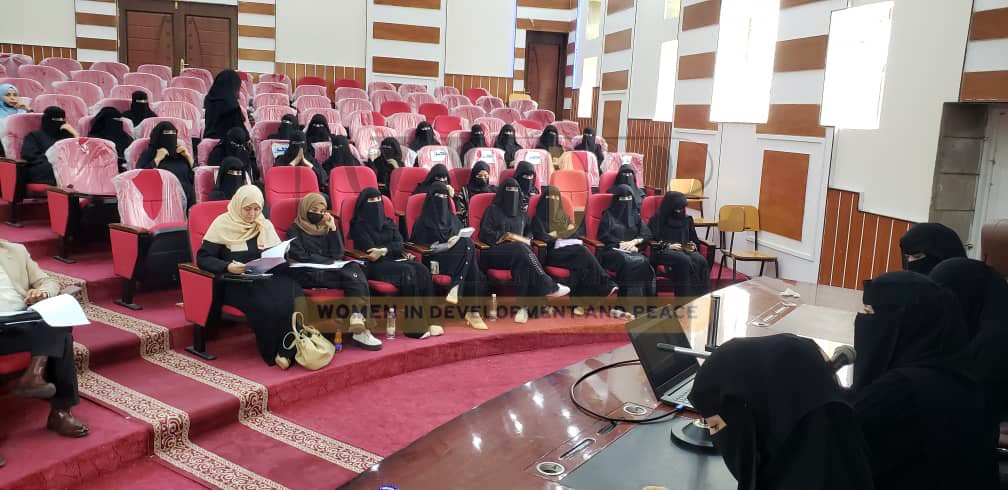Hebah Mohammed – Women for Development and Peace
The stories of successful women in Yemen serve as a source of inspiration and motivation for other women. They reflect the willpower and immense capabilities women possess to achieve success and make a positive impact on society. Higher education and scientific research are among the most important fields where influential female leaders have shone throughout the years in Yemen.
These women are distinguished by their tangible and remarkable achievements in their respective fields. They have achieved clear successes in education and scientific research. These female leaders and pioneers are known for their dedication and diligence in realizing their visions and academic goals.
Leaders in Science and Research
From the halls of Sana’a University emerges the prominent figure of Professor Dr. Mahasin Munibari, a woman with numerous accomplishments and a distinguished scientific career. She holds a high standing within the university and in the hearts of her students and colleagues.
Her journey of academic contribution began when she met her husband, a doctor specializing in internal medicine. Together, they formed a powerful duo in the world of medicine and education. They were blessed with four exceptional children, led by their eldest daughter who holds a master’s degree in medicine, following in the footsteps of her inspiring parents. Their relationship was always built on scientific collaboration and hard work, striving to elevate the standards of science and education at Sana’a University.
Dr. Munibari was not only dedicated to her work in the classroom but also served as a supervisor for master’s and doctoral dissertations. With her passion and extensive experience, she guided students towards scientific research and excellence. She fostered strong relationships with international scientific centers and universities, presenting numerous research papers and collaborating with researchers outside Yemen. She currently heads the Center for Protected Environment at Sana’a University and chairs a department within the same university.
Regarding women’s participation in scientific research, Mahasin shared her perspective. She considered it a beautiful field that contributes to societal development and achieves economic and social progress. She firmly believes that science does not discriminate between genders and that everyone can contribute to building a progressive and balanced society.
She conducted important research in economic, social, and agricultural fields, particularly on the study of Qat in Yemen. She collaborated with the Canadian Center for Studies and Research, leading the research team under the supervision of Dr. Shibru Tidla from Addis Ababa University.
Mahasin Munibari has been and continues to be a role model for women in science and education. She proves day after day that women are capable of achieving success and excellence in various fields. She symbolizes strength and determination, working diligently to serve her community and elevate the standard of science in Yemen.
Al-Mahaqri: A Journey of Perseverance and Dedication

Muna Al-Mahaqri is a prominent figure in the academic field in Yemen. Her educational journey has been marked by excellence since her graduation with honors from the Faculty of Education at Helwan University, Egypt, in 1994. She then returned to her homeland to pursue her master’s and doctoral degrees.
Al-Mahaqri joined Sana’a University and was appointed as a teaching assistant in the newly established Faculty of Education in Arhab district. She strived to encourage female students from rural areas to pursue higher education. Arhab, being a remote and rural area, posed challenges, but Muna remained undeterred.
Earlier, Al-Mahaqri faced another obstacle when the Faculty of Education at Sana’a University refused her appointment as a faculty member. However, she refused to give up and joined the Faculty of Education in Arhab, becoming the first woman and teaching assistant to work there. Teaching first-year students marked the beginning of her career, and over time, the number of students grew, as did her influence and development.
Al-Mahaqri reflects: “The road to success was not paved with roses, but rather filled with insurmountable challenges. Despite the opportunities that came my way, such as the chance to study and receive a government scholarship for my bachelor’s, master’s, and doctoral degrees in Egypt, I faced significant difficulties in securing a position at Sana’a University.”
She continues: “Despite my academic excellence both internationally and locally, I was met with a categorical rejection from the Faculty of Education at Sana’a University for acceptance into their graduate program. However, this did not deter me. I decided to enroll in the graduate program at the Faculty of Arts, Department of Arabic Language.”
She adds: “I encountered new challenges as they required me to complete prerequisite courses, which took me two years. Afterward, I diligently fulfilled all the requirements of the Faculty of Arts and successfully obtained my bachelor’s degree in Arts with very good grades. Today, I feel immense pride and joy that several of my students have become my colleagues after earning their doctoral degrees with exceptional excellence. After more than twenty years of teaching at the Faculty of Education in Arhab, I recently transferred to work at the Faculty of Education at Sana’a University. I will continue to work, teach graduate studies, and encourage women to pursue education, achieve the highest academic degrees, and reach decision-making positions.”
She further elaborates: “I joined the Center for Women’s Studies and Research at Sana’a University as a researcher in 2007. This experience has been enriching and added significant value to my career path. I did not limit myself to research and academic work alone but also strived to achieve a balance between my academic and social roles. In 2010, I founded ‘Aroos Al-Yemen magazine, the first specialized magazine dedicated to women’s issues, published quarterly. Additionally, I established and managed the ‘Yemeni Linguistic Scientific Society magazine in 2014.”
In the same year, Al-Mahaqri established ” Shehrazad cultural foundation,” the first Yemeni institution dedicated to supporting Yemeni women’s creativity. The foundation empowers Yemeni female creators culturally, economically, and academically through training workshops, seminars, and exhibitions. Al-Mahaqri remains committed to achieving these goals to this day.
Regarding policies and procedures to enhance women’s participation in academia and scientific research in Yemen, Al-Mahaqri states: “The most important of these measures are reducing tuition fees, easing the requirements for enrolling in postgraduate and higher education programs, providing free scholarships for outstanding students, reinstating and expanding scholarship programs, encouraging girls to pursue scientific disciplines, and empowering them to confidently and competently enter the fields of information technology and artificial intelligence.”
She pointed out that the political situation, instability, salary disruptions, and airport closures have all impacted her academic and professional journey. Participating in most scientific conferences she was invited to became impossible due to travel difficulties. This included the Arab Women Creators Conference in Tunisia, where she submitted a paper on “Citizenship in Yemeni Feminist Novels” but was unfortunately unable to attend.
Inspiring Female Role Models
In a world driven by women’s aspirations and their strong desire to attain leadership positions within Yemeni society, influential figures have emerged in higher education and scientific research. One such figure is Dr. Wahiba Fari’, the academic who established Queen Arwa University and became the first female president of a private university in Yemen in 1996. She was also appointed Dean of the National Institute of Administrative Sciences in Yemen, responsible for training senior administrative leaders for the Yemeni government from 2006 to 2011. She currently works as a professor, researcher, political writer, and lecturer at various universities, and manages several specialized research centers.
Another inspiring example is Professor Dr. Muhjat Ahmad Ali, who was appointed the first female dean of a college in Yemen, specifically the Faculty of Dentistry at the University of Aden.
Dr. Muhjat excelled as one of the leading women in oral and dental surgery. Through her strong will and insightful vision, she established the first College of Dentistry in Yemen. This was not the first time she had proven herself as a trailblazer. She was also the first female member of oral and dental surgery for the World Organization of Surgeons in Germany and the Local Anesthesia in Surgery Organization.
Her journey was not without obstacles. She faced criticism and provocative analyses questioning her worthiness of the trust and recognition bestowed upon her. However, she used these challenges as motivation to work harder, excel, and establish herself as an influential and responsible force. She dedicated her time and effort to be fully prepared for the significant responsibility entrusted to her.
Reflecting on her experience, Dr. Muhjat emphasized the importance of women possessing competence, academic qualifications, and necessary experience to attain leadership positions. She affirmed that men and women are not different in their capabilities, but societal customs and traditions often hinder women.
Dr. Muhjat worked diligently to realize her vision and develop her leadership and administrative skills. In one of her interviews, she urged ambitious women to believe in their abilities, work hard on self-development, and pursue their goals fearlessly. She encouraged them to challenge customs and traditions and strive for excellence and success in their professional lives, emphasizing that they deserve to be at the forefront and hold leadership positions.
Numerous other pioneering women in higher education and scientific research have proven to the world that Yemeni women deserve recognition and opportunities equal to men. Dr. Rukhsana Ismail stands as an inspiring example, leaving a significant mark on education and scientific research.
After completing her university studies and earning her doctorate in Petrochemical Technology, Dr. Rukhsana joined the faculty at the University of Aden, appointed as a professor in the Chemistry Department of the Faculty of Education. Her contributions extended beyond teaching to establishing research centers and scientific societies dedicated to promoting women’s roles in the scientific community.

